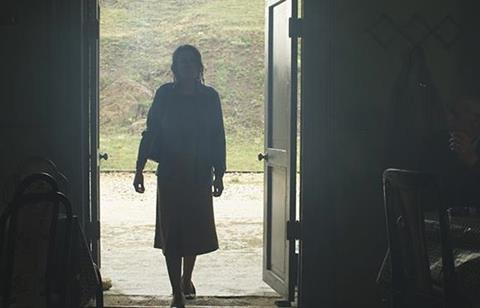Dir: Isa Qosja. Kosovo. 2014. 93mins

Three Windows And A Hanging (Tri Dritare Dhe Nje Varje), which world premiered in the Sarajevo Festival competition, could fit not only its Kosovo background and recent history but more places around the globe than one would like to think of. As told by veteran director Isa Qjosa, the rape of a country schoolteacher, which she reveals to the media and is instantly ostracised for it by her entire village, carefully avoids stepping on any toes, making any outright accusations, specifically identifying the rapists or flashing back to the horrors of the recent Balkan war for the rape itself.
Qjosa’s main intention is to paint the portrait of a strictly male-oriented society, still hung-up on values such as family honour and reputation, prized far and above humanity and tolerance.
The rape itself is not the issue in this case, Qjosa’s main concern is with society’s response once it is brought up into the open and the additional punishment inflicted on the victim for refusing to keep it a secret.
Lushe (Irena Cahani), together with three other women in her village, were brutally raped after the police had arrested their husbands. Later, once the war is over, her husband still absent and his survival uncertain, she is interviewed by a journalist (Serb movie star Mirjana Karanovic in a guest performance) investigating the war crimes and tells her the story. A newspaper prints it and a few days later it reaches the teacher’s remote village.
Scandalised, the men, headed by the village mayor Uka (Luan Jaha), decide to turn their back on the woman who offended them all by disclosing the shameful facts that many, but not all of them, ignored. They refuse to talk to her or send their children to her class and the mayor tells her openly she should take her boy, leave her home and move away from their village. After all, every man is now suspecting his own wife of having been one of the victims and having thus defiled the sanctity of their marriage and indeed, one of the women unable to deal with the burden of shame, does commit suicide.
Told in a simple and straightforward manner, the film verges once in a while on the melodramatic only to redress itself and display remarkable restraint. Lushe’s interview with the foreign journalist, done in one shot with Lushe herself never seen, only heard, is particularly effective. Uka’s confrontation with his daughter’s suitor is economic and ironic at the same time while Lushe’s son planting a tree in the garden to signify their decision not to move from their home is uncomfortably close to a cliché.
Qjosa’s main intention is to paint the portrait of a strictly male-oriented society, still hung-up on values such as family honour and reputation, prized far and above humanity and tolerance. Nicely shot and intensely acted, the plot could have probably been given a more personal and incisive turn, if only by searching a bit more behind the façade of the male characters, who, with the exception of Uka, seem complacently one-dimensional.
If there is any criticism to be made of the film, it comes out into its prologue, when three old men sitting in the shade of a glorious tree, and accusing each other of being senile, argue about the right way to tell a story. This may have been a pun intended at the film’s future critics, but could apply to the film itself.
Production company: CMB
Contact: CBM – Mentor Shala, alash69@gmail.com
Producers: Shkumbin Istrefi, Mentor Shala
Screenplay: Zymber Kelmendi
Cinematography: Gökhan Tiryaki
Editor: Agrom Vula
Main cast: Irena Cahani, Luan Jaha, Donat Qosja, Aurita Agushi, Leonora Mehmetaj, Orik Morina, Xhevat Qorraj





















